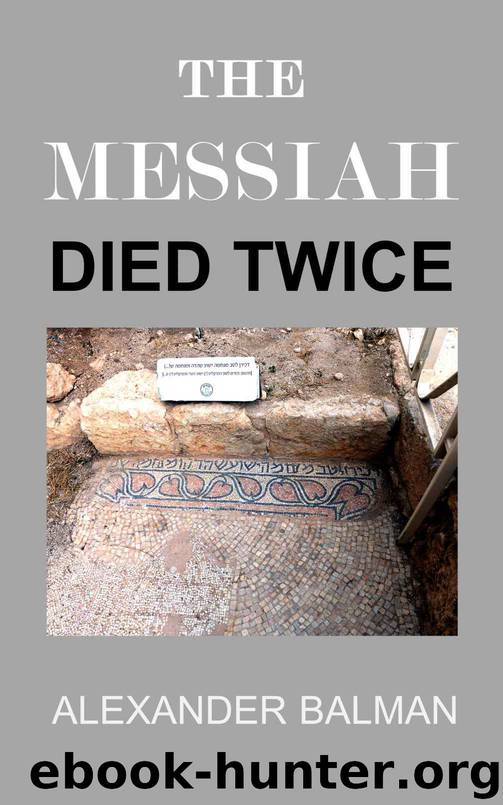THE MESSIAH DIED TWICE by Alexander Balman

Author:Alexander Balman [Balman, Alexander]
Language: eng
Format: epub
Publisher: Mendele Electronic Books Ltd
Published: 2017-12-16T22:00:00+00:00
11. Resurrection from the dead
The promise of eternal life brought many believers to the Messianic sect. Those members of the sect did not question the basic belief in the dead returning to life, but took it for granted. At most, Jesus was asked about the proper behavior needed by the believer in order to achieve eternal salvation:
"Rabbi, what good deed must I do to have eternal life?" [153]
In contrast to this kind of simple and unconditional belief, the sheer possibility of life after death was a central subject of dispute between the popular Pharisaic sect and the aristocratic Sadducee sect. The Sadducees, who were the members of the Jewish ruling classes during the Second Temple Period (530 B.C.E – 70 C.E.) scorned the popular beliefs which gave the common people hope in a new life in the next world – a better world that the one they were living in. Josephus explained concisely the differences between those sects: "Among the Pharisees… there is a belief that souls possess an undying essence, and that in the Underworld there is reward and punishment for those people who, during life, did good or bad deeds… while, according to the doctrine of the Sadducees, the soul disappears together with the body." [154]
Christian literary sources, too, emphasize the refusal of the Sadducees to acknowledge the truthfulness of the belief in life after death: "The Sadducees, who say there is no resurrection, came to Jesus and questioned him." [155]
When Paul was put on trial before the Sanhedrin assembly, which included representatives of the Sadducee elite, he did not hesitate to point out his own Pharisaic beliefs about the resurrection of the dead: "Paul, knowing that some of them were Sadducees and others Pharisees, called out in the high council: 'Brothers, I am a Pharisee, the son of a Pharisee! It is because of my hope in the resurrection of the dead that I am on trial!' As soon as he had said this, a dispute broke out between the Pharisees and the Sadducees, and the assembly was divided. For the Sadducees say there is neither a resurrection, nor angels, nor spirits, but the Pharisees acknowledge them all. A great clamor arose, and some of the teachers of religious law who were Pharisees stood up and argued vigorously, 'We find nothing wrong with this man!'"[156]
After he had used his Roman citizenship to demand protection and immunity, Paul was brought by the Romans from Jerusalem to Caesarea.
There, at the governor's requirement, he presented his case before Agrippa – the Jewish king of the northern part of Israel during the years preceding the Great Revolt – and again stressed the absolute similarity between the Pharisaic belief in the resurrection of the dead, which was widely accepted among the Jewish people, and his own belief in Jesus' resurrection: "And now I stand on trial because of my hope in the promise made by God to our ancestors. And for this hope I am accused by Jews, O King! Why would
Download
This site does not store any files on its server. We only index and link to content provided by other sites. Please contact the content providers to delete copyright contents if any and email us, we'll remove relevant links or contents immediately.
The Lost Art of Listening by Michael P. Nichols(7506)
Why I Am Not A Calvinist by Dr. Peter S. Ruckman(4153)
The Rosicrucians by Christopher McIntosh(3519)
Wicca: a guide for the solitary practitioner by Scott Cunningham(3178)
Signature in the Cell: DNA and the Evidence for Intelligent Design by Stephen C. Meyer(3138)
Real Sex by Lauren F. Winner(3023)
The Holy Spirit by Billy Graham(2952)
To Light a Sacred Flame by Silver RavenWolf(2823)
The End of Faith by Sam Harris(2742)
The Gnostic Gospels by Pagels Elaine(2531)
Waking Up by Sam Harris(2460)
Nine Parts of Desire by Geraldine Brooks(2369)
Jesus by Paul Johnson(2362)
Devil, The by Almond Philip C(2331)
The God delusion by Richard Dawkins(2309)
Heavens on Earth by Michael Shermer(2284)
Kundalini by Gopi Krishna(2185)
Chosen by God by R. C. Sproul(2164)
The Nature of Consciousness by Rupert Spira(2108)
